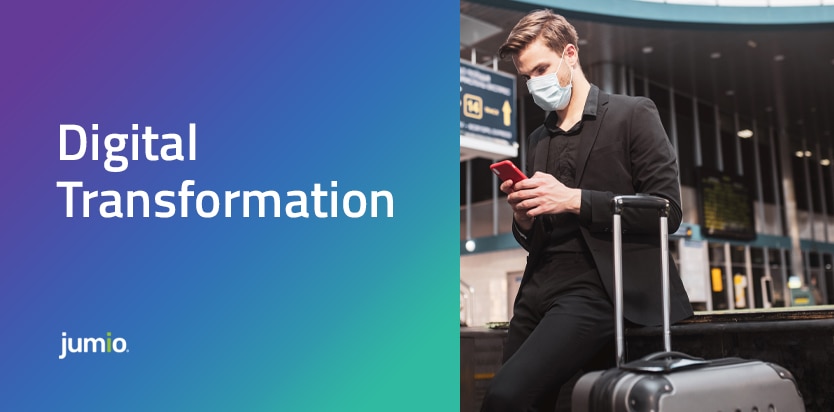
Airlines have been hit particularly hard by the COVID-19 pandemic, with an unprecedented 60% global decline in total passengers in 2020 and lost revenue totaling approximately $371 billion, according to International Civil Aviation Organization analysis. Given the positive economic impact of vaccination programs and an expected recovery of the economy in the second half of 2021, the airline industry is preparing for a big rebound.
Digital Transformation and Key Usage Models for Online Identity Verification
Digital transformation has become a requirement for all successful organizations, especially in the heavily hit travel and accommodation industries.
Jumio works with global airlines including United Airlines, EasyJet and Hawaiian Airlines, and has seen first-hand how online identity verification can help kick-start digital transformation initiatives.
With online identity verification, passengers can identify themselves digitally and remotely: all they have to do is to take a picture of their government-issued ID (e.g., a passport or driver’s license) and a corroborating selfie. The online Identification step is often included in the airline’s mobile app or on its website.
We have seen mainly two areas where online identity verification can help airlines: improving the passenger check-in experience while lowering costs, and fighting online fraud by enabling safer online financial and e-commerce transactions.
Learn What Gartner Says About Fraud Detection and Authentication
Market Guide for Identity Proofing and Affirmation
Improve Customer Check-Ins while Lowering Costs
Airlines have looked for ways to simplify the customer check-in experience since the introduction of the web and mobile apps. This is because the check-in experience is considered as a waste of time for customers: nobody likes standing in line to have their documents inspected by an airline representative. Passengers would welcome a more streamlined and user-friendly check-in process.
Also, check-in logistics are a definite cost for the airline: traditional check-in models allocate personnel statically to desks for three hours per flight, independently from actual customer presence at check-in counters.
Online Identity verification can help airlines create new check-in models that are more user friendly and cost effective.
1. Self check-in
With some airlines, passengers can perform a self check-in and verify their identities using the airline’s mobile app or at a web-connected kiosk at the airport. In this case the passenger’s documents and identity are verified automatically and remotely, allowing them to bypass the check-in line.
2. Faster mobile check-in
Mobile check-in has become a standard offering for many airlines. However, checking in on a small phone screen is not easy, especially when it requires completing forms with lots of personal information. Mobile check-in times can be cut from two minutes to 20 seconds by having customers perform Identity verification when booking a flight. Instead of asking passengers to complete lengthy forms, the customer will take a picture of their government-issued ID. The personal information can be directly extracted from the ID using optical character recognition (OCR) and then populated on the mobile/online form. By requiring the customer to also take a selfie, and by comparing it with the picture on the ID, the airline can be sure that the person checking in is who they say they are and that the ticket belongs to them.
3. Secure boarding
Newer passports include a Near Field Communication (NFC) chip which contains in electronic form all the documents, personal data and the picture of the passenger secured by a strong embedded security certificate. The NFC chip content can be read by the identity verification app: by performing identity verification using a mobile phone, the passenger can scan the NFC on their passport before boarding an international flight to confirm their identity as an additional security measure, without requiring security personnel to perform this
Fight Online Fraud and Improve Online Experience
A growing number of passengers purchase airline tickets online, airlines have upgraded their websites to offer retail e-commerce capabilities. However, as all other e-commerce and online financial services, airline websites are subject to hackers and cyberattacks.
Online identity verification can help airlines add an additional layer of security when customers perform financial transactions using their e-commerce platforms and can help deter fraud.
4. Protect online airline ticket purchases
In some cases hackers may try to buy airline tickets using stolen credentials or impersonating customers based on information purchased on the dark web. In this case online identity verification helps to prevent online scams and bots.
5. Shield frequent flyer programs
Hackers and fraudsters may try to gain control of a legitimate frequent flyer account and steal the account owner’s points or miles. Their goal is to use these stolen miles to purchase goods from program partners. Online identity verification serves as a powerful fraud deterrent for many scammers who prefer not to share their own likeness with the airline they’re looking to defraud.
6. Improve online customer experience
It’s important to balance fraud prevention with the user experience in order to optimize conversions and avoid user drop-offs. Airlines can use online identity verification to streamline online transactions —by scanning the government-issued ID, the personal data is automatically extracted and can be used to pre-fill online forms. This makes it more likely for the user to complete the online journey, whether they’re enrolling in a frequent flyer program or booking a flight.
Airlines traffic is forecasted to grow dramatically in the second half of 2021 with the broad availability of COVID-19 vaccines and with more travelers allowed and willing to travel. Digital transformation is one of the key pillars that will sustain this kind of growth, and online identity verification can help airlines get back into business and embrace the new digital age.

